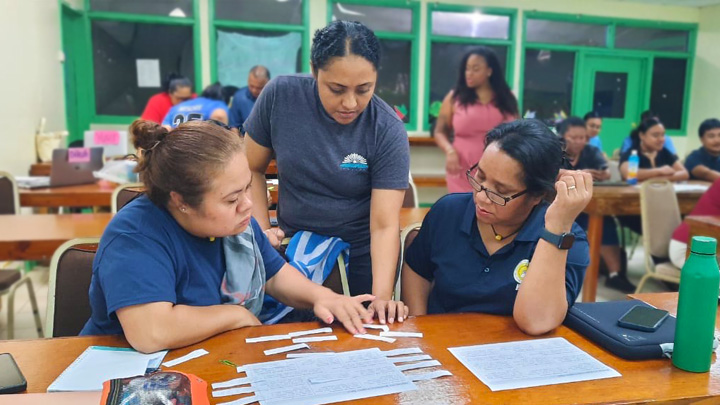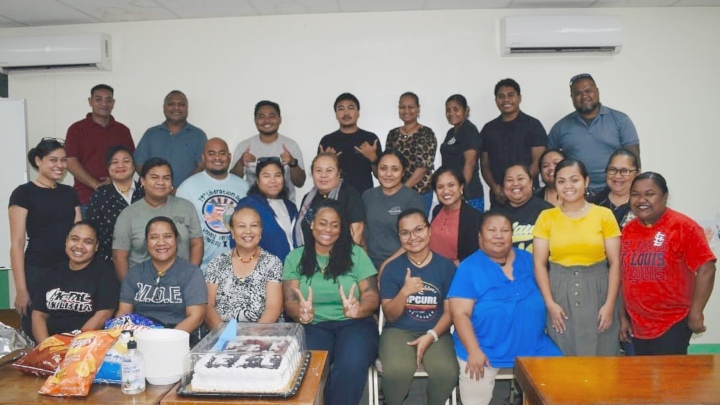Disrupting math logics in the Western Pacific

If you want to visit Palau, you have to be willing to suffer just a bit. To reach this island country in the Western Pacific from San Diego, you’ll need to endure 16 hours of flight time with stopovers in Hawaii and Guam.
An avid traveler, Brittany L. Marshall knew what she was getting into. The assistant professor in the San Diego State University School of Teacher Education eagerly volunteered to bring her elementary math teaching methods course to SDSU’s long-running bachelor’s degree programs in Palau.
After all, the benefits of an island paradise are worth the discomfort of a couple of long-haul flights.
What she wasn’t necessarily expecting was that this would be a deeply-meaningful highlight of her 15 years in teaching — an experience that both left her heart full and offered exciting new inspiration for her research into math education.
“They’re brilliant,’” Marshall said of her Palauan pupils. “I was blown away, especially by the students’ writing.”
This semester, Marshall is bringing her methods course to a Palauan cohort of 26 students seeking a bachelor’s degree in interdisciplinary studies. It’s a diverse group, ranging in age from their 20s to their 60s, who are engaged in fields such as education, nursing as well as industries outside the helping professions.
It’s all part of an initiative of SDSU’s Interwork Institute, which has been filling a void of bachelor’s degree programs in this country of 17,000 residents since the mid-2000s.
While the course will play out asynchronously throughout the semester, Marshall visited for a week of in-person instruction in late August. For the curriculum, she stripped out the material related to California credentialing requirements and left in the fun stuff — activities that get to the root of children’s mathematical thinking.
“I took everything that was exciting and really gets you to look at the brilliance of young children and put it in the course,” Marshall said. “I knew I only had a week with them, so I brought all the greatest hits — all the days that are the most fun for our students at San Diego State.’”

While her students spoke Palauan and English, there is also Japanese influence because of the island’s long colonial past. As such, some of the students referred to her as “Sensei.” Still glowing from the experience as she’s back in the States, Sensei Marshall was left with two major takeaways.
The first pertained to her research. Marshall’s research focuses on disrupting traditional mathematics logics, namely, assumptions about who belongs in mathematics spaces. It’s an area of expertise that is deeply personal, informed by her own experience facing systemic barriers as an aspiring architect coming from a predominantly Black neighborhood on the South Side of Chicago.
While race was not a factor in Palau — all her students are Palauan — she discovered that the western-style schooling model still in use there had created similar barriers. In exercises, she encouraged her students to think about their own experiences with math during their primary and secondary schooling.
When did math teachers make them feel good or confident?
When did teachers make them feel excluded?
“A lot of them told me they felt pressured or even embarrassed or punished for not knowing their times tables and how it made them feel very afraid of math class,” Marshall recounts.
These may have been unfamiliar surroundings, but the answers were all too familiar.
“It really put a different context and spin on the stuff that I’m interested in, which is how teachers disrupt the forces that push children out of math and make them feel like they can’t do it,” Marshall said. “To see it in this completely different context was something that I did not expect. It was exciting, but it was also upsetting.
“It also made me think about the way that math is taught in this very strict colonial aspect.”
The other takeaway was much more hopeful. Marshall was heartened to see the preservation of the Palauan culture and language. Palauans are known to be very family-oriented, and she could see that in her cohort, a group that is entering their third and final year taking evening classes together.
“You really feel the love in the room and the care that they have for one another,” Marshall said. “When I would leave for the day, most of the class would still be there talking and gossiping. I loved it. I was also blown away by their hunger to finish their degrees. While many didn’t need it for their careers, you could tell it was a source of pride. Which felt all too familiar.”
“I think if Palauans are able to get back to their cultural ways of doing things in their communities, I know they’re the ones to fix the problem (with math education),” she added.
They also seemed to bond with their new Sensei. On her last day in-person with her students, they asked if she would return for their graduation in June. She hopes she can.
Sixteen hours across the Pacific is a small price to pay.

